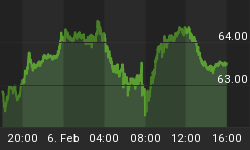As new data on foreign investment pours in each week, I look to see whether the bail-out of our deficit continues. This week foreign purchases of Treasuries by Foreign Central jumped by $20B. Another $2B of Agency debt was purchased. Because the last few weeks have shown very little buying, the quarterly total of buying is still much lower than it was a year ago.
Below is an updated chart showing foreign central bank purchases of Treasuries and Agencies held in custody at the Federal Reserve. It is the "early warning" data on how much - or how little - foreigners are purchasing.

The source for these investments by foreigners is the dollars collected by countries that sell us goods. The economic theory and accounting assumption is that our deficits come back to us in the form of investment. US trade deficits have been growing as much manufacturing is now done abroad with cheap labor, and the cost of imports, primarily oil have risen. Below is a look at the trade deficit and the net cross border investment flow. In general, they move together, but the investment flows are much more volatile. The trade deficit scale inverted. They move in parallel, but with a lot more volatility for the investment. Trade is based on longer term contracts, but investment can be made or removed in a day. This is monthly data, and the investment includes purchases of corporate bonds and equities, both by foreigners and by the US, so this is a more inclusive tabulation than the above. The point is that investment volatility is high.

My conclusion is that this one big jump in weekly purchases by central banks should be watched because it is so big, but that it may just be a one-week surprise. The quarterly view still shows that foreigners are slowing their purchases. Interest rates are up and the dollar is down since I started this analysis, which is consistent with that slowing.















